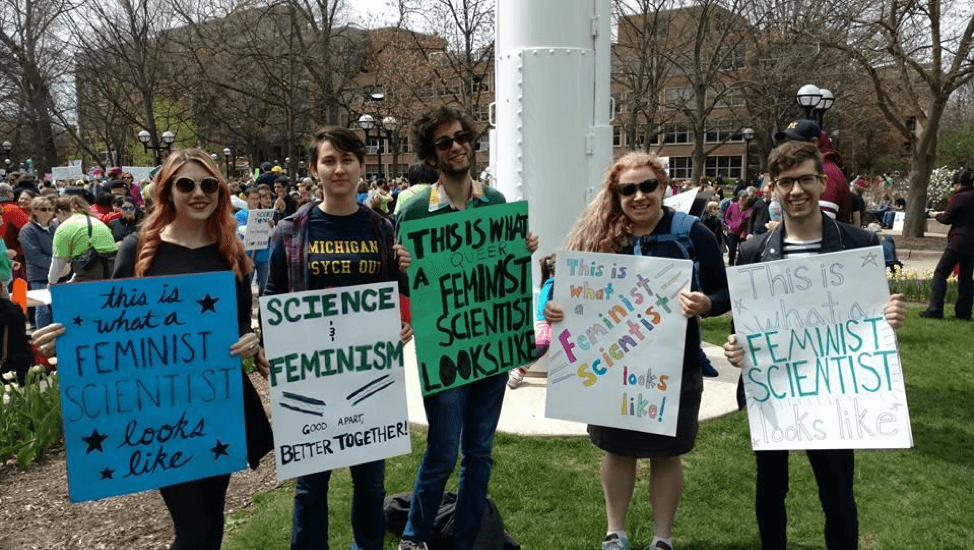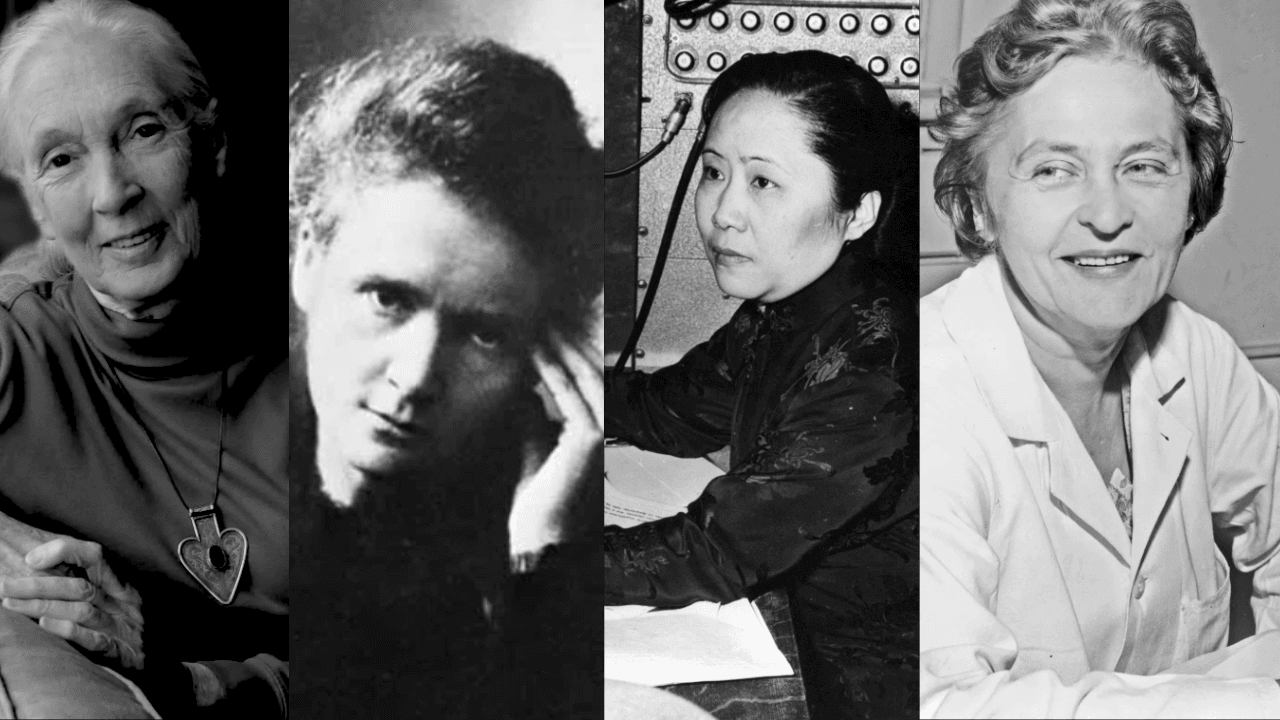Feminist science questions the nature and function of the scientific community. Due to different underlying reasons, science and technology have been labelled as ‘male‘ or ‘masculine.’ One reason is that the scientific disciplines and professions are male-dominated: significantly more men are scientists, especially in the domain of natural sciences—physics, astrophysics, chemistry, mathematics, etc. Hence, feminist science questions the dominance of one group, interjecting with the notion of gender and power dynamics.
Science has been considered free from bias and empirical in nature. However, as it is a male-dominated area, feminists argued that masculine characteristics are being projected onto the natural world. In that sense, the scientist is not just an observer or researcher; he is a mediator. Here, subjectivity plays a role but not in a harmless way; his perceptions reflect his observations of the natural world, as well as the theories that are built around the observations.
Feminists argue that “knowledge is power“—generally speaking, scientific knowledge in modern society gives the utmost power. Hidden beyond the surface of unbiasedness, science has been an integral part of agencies supporting and extending racism, sexism, and other hierarchies in modern society. Conquering the world of nature and beyond is closely linked to dominance over other individuals and groups, as well as a division within the individual self, where the objective mind subjugates the emotional self.
Feminist science is all about answering questions like—Why science being unbiased is not free of it? Who is in the dominant position of scientific knowledge, and how does it affect the basic fountain of knowledge itself? Feminist science tries to answer these questions by incorporating feminist methodologies in scientific research. It has done so by criticising science.
Feminist critique of science
Feminist critical perspectives challenge knowledge systems that marginalise the points of view of women. References regarding rationality, objectivity, and scientific methods, central to modern science projects, are deconstructed using a feminist lens. Feminist scholars are critical of the underlying statement generated by science. For example, the image of science as representing universal ‘truth‘ and the image of the scientist as an ‘objective‘ is questioned. Some feminists point out various alternate ways of conceptualising knowledge about the natural world.

The gendered subjectivity of scientific theories is reflected in the theories they formulate. For instance, masculine traits (generated by social conditioning) like aggression and competitiveness get translated into specific theories and images. These may include the image of the human immune system as a battlefield or animals as obsessed with competition and territoriality. In a sense, masculine characteristics are being projected onto the natural world. There are different reasons why science is labelled as ‘male‘ or masculine. Francis Bacon, the most influential early philosopher of science, repeatedly described the natural world as female and an object to be pursued, captured, and mastered.
Feminists have emphasised how scientific theories are structured, reinforcing hierarchical divisions between males and females. Scientific theories are treated as knowledge having gaps that can be deconstructed and reconstructed.
It is claimed that the subjectivity of the scientist does not enter the picture of objectivity and rationale; it is carefully avoided by employing universal, objective tests that could be reproduced anywhere in the world. However, objectivity and rationality are conceptualised as masculine traits, and masculinity itself is socially constructed to include the elements of objectivity and rationality. Since the common understanding of masculinity emphasises successful men, it is believed that they can detach themselves from emotions and concentrate on the objects of their study in a completely unemotional way.
Feminists have emphasised how scientific theories are structured, reinforcing hierarchical divisions between males and females. Scientific theories are treated as knowledge having gaps that can be deconstructed and reconstructed. The deconstruction of scientific knowledge reveals the deeply rooted processes of naturalising male dominance in society, which is usually acceptable. Donna Haraway’s analysis of primatology (a discipline devoted to the scientific study of primates) shows how theoretical accounts are related to popular cultural images of primates. These popular notions often direct research goals, scientific observations, and interpretations, and in so doing, they reinforce positions of power—of males over females, of humans over animals, etc.
Feminist critiques of science demonstrate the flawed assumptions underlying many conventionally accepted understandings of the natural world and its diverse phenomena. Alternative understandings with greater and more reality are possible. Overall, the feminist critique of science makes us think about how science has been done in the past and how it can be improved to be more fair and open to everyone.
Feminist science—emergence and significance
Feminist philosophies of science emerged during the 1980s and 90s, the period of the “science wars.” The interdisciplinary analysis of science during this period included investigating how society shaped the context of research methodology.

Feminist science also extends to questions about the methodology, epistemology, and ontology of scientific inquiry. The scientific community carried this change as a gateway to relativism and a threat to the pre-assumed objectivity of science, which they believed was guaranteed by the unbiased nature of their scientific method.
The early feminist philosophy of science and epistemology focused a significant portion of its attention on defending the concept that science that was informed by feminist analysis would be superior to science and would not be incompatible with the goals of science (such as the search for truth) in the manner that critics feared it would be. Not all feminists wanted to change the way science was done completely; in fact, most of them wanted to keep some sense of objectivity and fight relativism. Sandra Harding called people who thought science was basically factual and that feminist goals could be reached by getting rid of bias “feminist empiricists.”
Feminist science is also intersectional; it believes that gender does not work alone; it interacts with race, class, sexuality, and other marginalised sections.
Rational choice theory, which does not consider gender characteristics, can be criticised for being tainted by sexist values. However, a feminist empiricist answer is possible. It is not empirically adequate for research to not take gender into account when gender is an important factor. While this brings up questions about relevance, it also suggests that values are unavoidable and should be taken into account for all important phenomena.
Feminist science is also intersectional; it believes that gender does not work alone; it interacts with race, class, sexuality, and other marginalised sections. For instance, feminist thinkers like Ruth Hubbard have said that the medical field ignores women’s health needs because it treats male bodies as norm. The failure to consider women when investigating cardiac health looks like a sexist bias in the research. This might be seen as straightforward sexism resulting from considering the lives of men to be more important than the lives of women.
Donna Haraway’s “Cyborg Manifesto” challenges the conventional boundaries between humans and machines and the gendered concepts that reinforce them. Haraway’s “cyborg” idea helps people think more openly about the identity and connection between science and society.
Rayna Rapp’s Study on Amniocentesis shows how medical technologies, especially those used in reproductive health, affect women’s decisions and show what people value. Her work shows how women are treated differently by the medical system in terms of power.
Feminist science wants to change how knowledge is made and understood through these criticisms and examples. It pushes for a more inclusive science that considers different points of view and questions the biases that have previously shaped scientific knowledge. Feminist science makes gender and other social factors part of the scientific method, enhancing the possibility of equitable study and achievements.
References:
- Bacon, Frances (1964). Thoughts and Conclusions, and several other writings. Liverpool: Liverpool University Press.
- Harway, Donna. (1990). Simians, Cyborgs, and Women: The Reinvention of Nature. Routledge & CRC Press.
- Harding, Sandra. (1986). The Science Question in Feminism, Ithaca NY: Cornell University Press.
- Rapp, Rayna. (2001). Gender, Body, Biomedicine: How Some Feminist Concerns Dragged Reproduction to the Centre of Social Theory. Medical Anthropology Quarterly 15(4): 466-477.
- Lennon, Kathleen. (1999). ‘Natural Sciences,’ In Alison M. Jaggar & Iris Marion Young (Eds), A Companion to Feminist Philosophy. Oxford: Basil Blackwell.
- https://www.marxists.org/history/etol/newspape/atc/2412.html
- https://plato.stanford.edu/entries/feminist-science




